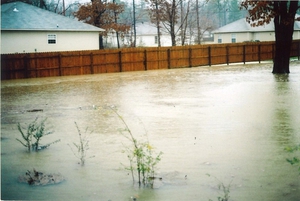Flood Plain Information
NOTICE TO ALL BENTON RESIDENTS
The purpose of this notice and information shared below is to inform and to help protect property and citizens of the City of Benton. This information reinforces the importance in knowing where local flood hazard areas are located in the city, provide key information regarding flood plains, highlight the importance in being aware of drainage systems and their relationship to flood plains, the need to be diligent in helping to keep all drainage systems clear, and the importance of maintaining flood insurance. We have provided key local contacts and highlighted requirements contained in Ordinances. We also include suggested ongoing maintenance actions if your property has a significant drainage system adjacent to or one that passes through your property. Lastly, we identify some key requirements if any new or remodel building permits are to be sought if your parcel / property is within the Special Flood Hazard Area (SFHA). Please take a few minutes to review all of the items presented to elevate questions, better understand any actions you may need to take to obtain permits, and to be better prepared to protect yourself.
The Special Flood Hazard Area

The SFHA is the area subject to inundation by a 100-year flood. The SFHA is the first area to be flooded if the storm water extends outside of the Floodway of a channel, creek, stream, or river. The SFHA is defined and shown on the Effective Flood Insurance Rate Map (FIRM) as compiled by the Federal Emergency Management Agency (FEMA). Every community is required to have a specific Ordinance(s) in place that define specific safety requirements if anyone wants to build within the SFHA. The latest and Effective FIRM panels have been adopted by the City of Benton and are listed below and on FEMAs website.
Flooding may be a real hazard in your area of town. Properties near the Saline River, McNeil Creek, Depot Creek, Salt Creek, Hurricane Creek (above and below the Dam), and Willow Depot Creek are most susceptible to inundation during the 100-year flood event. The FIRMs can be updated if data and other factors dictate more property damage and impacts. The above-mentioned areas have had additional property added to the SFHA areas designated on the 2012 updates and the 2020 updates of the City of Benton FIRMs and it is likely future updates will do the same.
You should keep in mind that the majority of homeowners experience storm water drainage issues even if your property is not within a designated SFHA or flood plain. This fact is oftentimes the result of the lack of maintenance with a drainage system that is near or crossing private property. The city conducts a great deal of maintenance within designated easements and right-of-ways but it is also residents who must perform key maintenance when drainage systems are adjacent or reside within their property.
An integral part of a Municipal Storm Water Sewer System (MS4) may exist in your area or may not but it is an important component along with the many drainage channels, creeks, and streams. The MS4 is constructed during development or improvements of streets and any new commercial or industrial sites. As the City of Benton continues to grow, so does the MS4 and our responsibilities. All storm water passes through new or existing systems (some but not all are part of a defined MS4) and channels (some but not all are defined as part of an MS4) ultimately affecting the designated Floodways and Special Flood Hazard Areas within the city limits. It is important to keep all of these systems clear and at full carrying capacity. The Streets & Drainage Department has a Storm Water Section and staff that are responsible to maintain and monitor the MS4 and other key components. Contact the Storm Water Section if you have any questions or concerns.
City of Benton Contacts, Ordinances, and Information:
- Contact the Street and Drainage Department at (501) 776-5990 for urgent issues or concerns with new or recurring storm water problems and/or the MS4. Refer to the Storm Water tab of this web site or to the Street and Drainage Department for more key information.
NOTICE: No work can be started in a drainage channel or creek unless Storm Water staff are notified. ADEQ will need to be contacted and a permit or Short Term Activity Authorization (STAA) may be required from ADEQ. Be aware also that wetlands may be affected and that could require other special permitting to be required.
When planning any Clearing & Grading, retaining wall, or fence installation be sure to contact Storm Water staff first to ensure permits are in place and that there will be no impact made to adjacent or down-stream properties and all other requirements for SWPPP are in place prior to beginning.
- Contact Community Development’s Floodplain Administrator, at (501) 776-5938 with regard to Flood Plains or FIRM panels or if seeking Flood Plain Development Permits and building permits for property that is within the SFHA.
NOTICE: No building permits are allowed within Floodways.
- Ordinance 17 of 2012 Flood Damage Prevention Program
- Elevation Certificate and Instructions-Just click on the link below and click on “Get Form”. You will get the latest fillable PDF of the form required by FEMA and a video tutorial and other information to complete the form. A Professional Engineer, Land Surveyor, or qualified Architect should complete the form and sign it.
https://fema-form-086-0-33.com/
Fema_nfip_elevation-certificate-form-instructions_feb-2020
- Ordinance 66 of 2013 Subdivision Regulations
- Ordinance 14 of 2017 Planning & Zoning Regulations
- Ordinance 55 of 2020 Moving Benton Forward – Comprehensive Development Plan
- Ordinance 5 of 1998 Street Regulation
*Refer to the Storm Water tab of this web page or under the Streets & Drainage Department for other permits, requirements, and information such as for Street Construction Regulations, Storm Water Drainage Manual, Storm Water Discharge Regulations,MS4 monitoring, Clearing and Grading or altering land permits, Retaining Wall permits, Fence Permits, and other pertinent and related drainage documents and information.
Flood Plain Regulations: Building or Remodeling any Structure in the SFHA:
- Maintaining safety and preventing flood damage in the City of Benton requires that the government and the citizen’s work together to keep the city prepared for a flood.
- The most important issue is to know is that building within a flood plain or SFHA requires a Flood Plain Development Permit and Elevation Certificate and that the lowest finished floor elevation of the structure must be elevated a minimum of 2 feet above the Base Flood Elevation (BFE) or the designated 100-yr flood elevation as shown on a FIRM for your property.
- There are other requirements that must be met if remodeling an older home that is within the SFHA. This is true whether the structure was built before a Flood Plain was designated for the area or not. Contact Community Development. Special Flood Proofing requirements may be required and will be strongly suggested if not required by local Ordinances and FEMA requirements. These rules also apply to any substantial improvements to buildings or repairs to any substantially damaged buildings. A substantial improvement is defined as an improvement or repair worth 50% of the original building’s value.
- All SFHA areas or Flood plains and any work including new developments and buildings or structures are monitored by the City of Benton, ADEQ, FEMA, and USACE.
- Do not dump or throw anything into drainage ditches or streams: Not only is it a violation of City codes, it is the primary source of flood occurrences in Benton. Even grass clippings and branches can accumulate and plug channels and outfall structures. Blocked drainage ways simply cannot carry water, and when it rains the water has to go somewhere. Every piece of litter contributes to flooding. It also helps to clean drains around your home, including roof gutters, downspouts, drain inlets, pipes, drainage ditches and driveway culverts
Obtain permits before clearing and grading or building: Development in the City of Benton is carefully regulated, and any construction that takes place, inside or outside a structure, requires permits from the City. When planning any Clearing & Grading, retaining wall, or fence installation be sure to contact Storm Water staff first to ensure permits are in place and that there will be no impact made to adjacent or down-stream properties and all other requirements for SWPPP are in place prior to beginning.
- Recognize the natural and beneficial functions of floodplains: Understanding and preserving these areas provides many benefits to the city, including flood protection. These areas spread out floodwaters, reducing their velocity and thus erosion damage, as well as collecting silt and sediments from upstream. They also act as a non-damaging location for floodwaters to drain to, thus reducing property damage. Furthermore, these areas are usually Natural Areas and oftentimes considered Wetlands, add to the beauty of our town and give an opportunity for wildlife to grow, and help in keeping storm water cleaner making them mutually beneficial to us and our environment.
Floodways:
Floodways are defined on the FIRMs and are critical areas to not be disturbed by any building or construction. The Floodway is the area within a body of water (channel, creek, stream, or river) or boundary of the normal pool level of a lake or pond which the body of water occupies normally or flows through. The extents or outer boundary of the floodway is typically where the SFHA begins. A floodway is outside of the SFHA and Ordinance 17 of 2012 does not allow any permits to be issued for buildings or structures within a designated Floodway. Very few permits will be issued for any work and they will have exceptions and special requirements for allowing temporary or permanent access roads or parking areas, utilities, etc. to cross or exist within floodways or for work to be done to replace utilities in these areas. No re-grading or placement of fill or changes to ground elevations can be made unless special approval is obtained from USACE, FEMA, the City of Benton, and appropriate FIS stream data is re-evaluated, submitted, and a “No Rise” Certification is substantiated and included.
Wetlands:
Wetlands are designated areas usually along designated floodways and/or SFHA zones but they can also be present along any channel and not located in a floodway or SFHA. They are defined and controlled by the United States Army Corps of Engineers (USACE). To ensure you are not faced with significant cost impact and delays, you should always seek a Determination from USACE when planning a development or site work along any drainage channel, creek, or stream. You must know for sure that there is or is not a wetland area and you must know where it begins and ends on the property. Wetlands cannot be disturbed unless approval from USACE has been received. Oftentimes, approval comes at a significant cost involving Mitigation. The process is lengthy and costly to consider seeking special permits to modify or impact any wetland area.
Flooding - Be Prepared:
The information here is presented in an effort to remind all residents that flooding is a real hazard during the winter and spring rainy seasons and flash flooding can occur during even small summer thunderstorm warnings.
Setup weather alerts and monitor them on your cell phone but in case of power loss, also have a battery operated radio on hand. Listen for news and monitor updates frequently. Replace batteries every 6 months at least in February and August.
Listen to the radio for news; bring outdoor belongings, pets, etc. indoors. If time permits, move valuable possessions to the upper floors or to safe ground.
Be prepared to evacuate and if advised to evacuate, do so immediately.
Report local flooding or severe runoff to 501-776-5930. Have other emergency numbers on hand.
Have a 2 day supply of water on hand.
Do not walk through flowing water.
If you are in a car, do not drive through a flooded area. Remember “Turn Around Don’t Drown”.
Additional safety information regarding flood hazards may be found on the FEMA and NFIP websites.
Flood Insurance:
The zone in which your property is in as noted on the FIRM is directly related to the Flooding Risk and therefore potential premium costs of insurance. Other factors such as if your home was built before or after the date of your property’s FIRM became Effective, if you have accomplished any flood proofing or other mitigation of your risk, if your property has flooded, and if any claims have been made due to flooding, etc. are all key elements. In addition, if it is a requirement in the Flood Damage Prevention Program Ordinance 17 of 2012 of the City of Benton to elevate the lowest floor elevation to at least 2 feet above the 100-year elevation or Base Flood Elevation (BFE) which is noted on your property’s FIRM. This Ordinance also requires that an Elevation Certificate and other documents may be required such as LOMA (Letter of Map Amendment) if fill is placed on the property and a Flood Plain Development Permit will have to be approved by the city to build within the SFHA. Insurance Companies also place demands for Elevation Certificates or for them to be updated, if building within a SFHA or if a FIRM is updated and changes the SFHA boundaries.
Use the following links to learn more:
https://www.fema.gov/flood-insurance/work-with-nfip
https://www.usa.gov/federal-agencies/national-flood-insurance-program
https://www.floodsmart.gov/flood-map-zone
Effective Flood Insurance Rate Map (FIRM) Panels:
The links below are the current and adopted Flood Insurance Rate Map (FIRM) panels that became Effective June 5, 2020 for the City of Benton and adjacent areas.
To download a copy of the Current or Effective FIRMs for City of Benton from FEMA: https://msc.fema.gov/portal/advanceSearch
You can use this site to purchase hard copies of any FIRM that you need: https://floodpartners.com/fema-flood-map/
- 05125CIND0B.pdf
- 05125C0225E
- 05125C0350E
- 05125C0355E
- 05125C0360E
- 05125C0365E
- 05125C0370E
- 05125CV001B.- (Flood Insurance Study - Volume 1 of 2)
- 05125CV002B - ((Flood Insurance Study – Volume 2 of 2)
Additional Links:
Links to important Flood Protection Information
- To get data and gage station data for Saline River at Benton:
River Flood Stages from USGS (phone 501-228-3604)
Visit this website to see what actions you can take today to lower your risk of flooding tomorrow https://www.reducefloodrisk.org/
What Residents & Business Owners Can Do to Be Ready for that Next Rain Event:
Contact the Streets and Drainage Department for maintenance issues. Review the information contained in the Storm Water tab of this web site.


- Rake up and bag leaves as often as possible before storms. Leaves clogging storm drains are the primary source of most flood occurrences. Blocked drainage ways simply cannot carry water, and when it rains the water has to go somewhere. Every piece of litter contributes to flooding. Do not dump or throw anything into drainage ditches or streams: Not only is it a violation of City codes, it is the primary source of flood occurrences in Benton. Even grass clippings and branches can accumulate and plug channels and outfall structures. Blocked drainage ways simply cannot carry water, and when it rains the water has to go somewhere. Every piece of litter contributes to flooding. If you discover a drainage course that is not functioning, please contact the City’s Street and Drainage Department.
- Clean drains around your home, including roof gutters, downspouts, drain inlets, pipes. Drainage ditches and driveway culverts.
- Make sure the adjacent ground around your foundation slopes away from your house.
- Do not construct driveway ramps in street gutters.
- Maintain Detention and Retention Ponds clean and clear of obstructions and remove silt build-up every 2-3 years to maintain optimal and designed storm water storage capacity. Also check and clear the pond’s discharge pipe and spillway annually. Every detention pond is designed to empty within 24 hours of a rain event. Larger storms or multiple heavy rain events within a 24 hour period may extend the time for a detention pond to empty and usually will dictate special attention and/or more frequent monitoring and maintenance.
- Obtain permits before building: Development in the City of Benton is carefully regulated, and any construction that takes place, inside or outside the building, requires permits from the City. If you have any questions about permits or whether you need permits, call the Community Development Department at 501-776-5938. Always check with the Community Development Department (776-5938) before you build on, alter, regrade, or fill on your property. Permit(s) may be required to ensure that projects do not cause more problems for you or for other properties downstream.
- Assess your need for flood insurance. If you do not have flood Insurance, talk to your insurance agent. Homeowner's insurance policies do not cover damage from floods.

